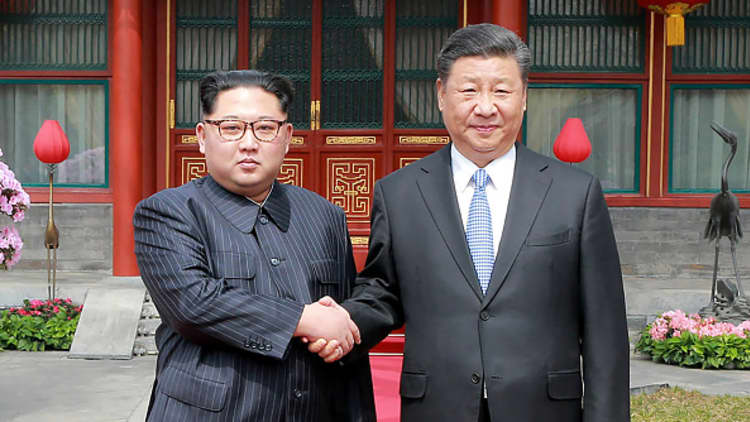
The Trump administration has been thrown another curveball ahead of potential historic talks with North Korean leader Kim Jong Un.
After two days of speculation, China announced that the North Korean regime's reclusive leader traveled to Beijing for bilateral talks with President Xi Jinping. Kim made the international trip by train in what is believed to be his first known journey abroad since assuming power in 2011.
Following Kim's visit, China said its isolated neighbor reaffirmed promises to denuclearize the Korean peninsula and meet with Trump. The North, on the other hand, continued its public silence on both matters.
"Comparing the Chinese and North Korean readouts of the meeting, I'm struck once again by the absence of any mention of the nuclear issue in the North Korean version," Joshua Pollack, senior research associate at the Middlebury Institute of International Studies at Monterey, California, told CNBC.
"The Chinese version says that Kim Jong Un reaffirmed North Korea's commitment to the denuclearization of the Korean Peninsula," Pollack said. "The North Korean version conspicuously fails to confirm this or any of the rest of the Chinese account of the leaders' exchanges."
Reacting to the news, Trump tweeted Wednesday that "there is a good chance that Kim Jong Un will do what is right" and "Kim looks forward to meeting me."
And if the North is willing to give up its nuclear weapons, the U.S. will most likely be tasked to give the reclusive state something big in return.
"The key question the world needs to ask is this: what does Kim Jong Un want for those nukes?" Harry Kazianis, director of defense studies at the Center for the National Interest, told CNBC.
"What would Kim Jong Un demand from the United States and South Korea for giving up its nuclear weapons? Would they demand, for example, the ending of the U.S.-South Korea alliance and the removal of all U.S. forces from the Korean Peninsula? Could Kim demand America also denuclearize, as has been the case in the past?" Kazianis added.
"This is all just the beginning of what will be a historic few weeks in Asia. Either history will be made, or we will be back at the brink all over again," he said.
Lisa Collins, a fellow with the Korea Chair at the Center for Strategic and International Studies, described Kim's meeting with Xi as an insurance policy.
"By repairing relations with China, Kim Jong Un was likely trying to ensure that he did not put all his eggs in one basket when it came to the U.S.-DPRK summit reportedly taking place in May," Collins said. "If summit talks with the United States failed over denuclearization, he [Kim] could fall back on the traditional relationship with China."
Collins also noted that North may try to take advantage of worsening relations between the U.S. and China.
"President Trump's move to impose steel tariffs and threats to start a trade war will put significant strain on the U.S.-China relationship," she said. "North Korea may have seen this time as an opportunity to draw closer to China and convince Beijing that siding with the U.S., particularly on sanctions, does not ultimately yield benefits for Chinese national interests."
White House press secretary Sarah Huckabee Sanders said Wednesday that Trump still plans to meet with Kim but did not elaborate on any details of the proposed summit.
The summit, which is slated to happen by the end of May, would mark the first time a sitting U.S. president meets with a leader from the reclusive regime.


